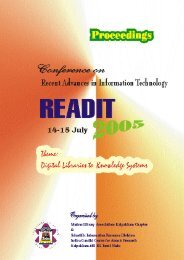READIT-2007 - Indira Gandhi Centre for Atomic Research
READIT-2007 - Indira Gandhi Centre for Atomic Research
READIT-2007 - Indira Gandhi Centre for Atomic Research
You also want an ePaper? Increase the reach of your titles
YUMPU automatically turns print PDFs into web optimized ePapers that Google loves.
y way of conferring it the status of Deemed to be University in August 2006. Like<br />
any Central University, NUEPA is fully maintained by the Government of India.<br />
With specialization in policy, planning and management in education, NUEPA<br />
is the professional wing of the Government of India. The prime concerns of NUEPA<br />
are with capacity building and research in educational policy, planning and<br />
management through research, training, consultancy and dissemination. NUEPA's<br />
origin can be traced to UNESCO Regional Center <strong>for</strong> Educational Planners and<br />
Administrators in 1961-62, in 1965, it was renamed as Asian Institute of Educational<br />
Planning and Administration. On the completion of the 10-year contract with<br />
UNESCO, the Government of India took it over and renamed the Institute as National<br />
Staff College <strong>for</strong> Educational Planners and Administrators in 1970. Subsequently the<br />
institute was renamed as National Institute of Educational Planning and<br />
Administration in 1979 emphasizing on research besides staff development.<br />
Promoting regional cooperation and international understanding in the field of<br />
human resource development is one of its major goals. Sharing of experience and<br />
resources, exchange of expertise and in<strong>for</strong>mation, are some of the steps that NUEPA<br />
takes in the direction of achieving such collective self-reliance among the developing<br />
countries. Both national and international delegates are encouraged to visit the<br />
institute. Study visits, regional seminars, workshops and short and long term training<br />
courses in educational planning and administration are organized <strong>for</strong> them. In the past,<br />
<strong>for</strong>eign participants have come from a wide array of regions including South, East and<br />
West Asia; Far East; Latin America; the Pacific; East, West and Southern Africa;<br />
Canada; Australia; USA and UK. NUEPA has also organized special tailor-made<br />
course <strong>for</strong> the benefit of international delegates e.g., from Afghanistan, Sri Lanka,<br />
China, etc.<br />
NCERT is an apex resource organization established in New Delhi on 1 st<br />
September 1961 as an autonomous organization registered under societies<br />
Registration Act of 1860 to assist and advise the Central and State Governments on<br />
academic matters related to school education in India. It is fully funded by the<br />
Government of India and provides academic and technical support <strong>for</strong> improvement<br />
of school education in India. It undertakes research, development, training, extension,<br />
publications and dissemination, and exchange programmes. NUEPA and NCERT<br />
both organizations are pursuing some key approaches to communicate knowledge to<br />
bring qualitative change in the academic research, training, transfer and dissemination<br />
of knowledge and services to achieve the desired goals. In this article, some<br />
significant approaches of knowledge communication such as arrange talks and<br />
discussions, lectures (teaching in classrooms), environment of debates and<br />
conversations, conferences, workshops and seminars, capture and appreciate the<br />
talents at workplace, sharing among intellectuals, strengthen knowledge repository,<br />
intranet, extranet and internet, etc. have been discussed which will rein<strong>for</strong>ce the<br />
intellectuals to communicate and share the knowledge and expertise among other<br />
employees across the organization. These approaches will also encourage the<br />
academicians to contribute their intellectual works, skills and expertise to strengthen<br />
the knowledge base to the future generation.<br />
Now the question arises why knowledge is pre-requisite <strong>for</strong> academic<br />
excellence? How it can be created, communicated and shared to grow the tree of<br />
knowledge across the organization. Burk (1999) stated, “knowledge management is<br />
not a project that begins and ends, but an ongoing and evolving change in the way an<br />
162

















